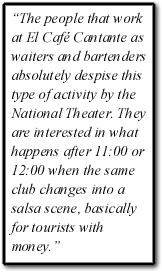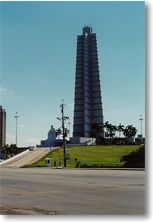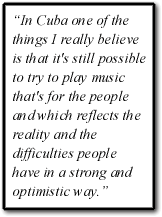|
|
|
 |
|
“It's better to confront difficulties with a little bit of rumba in your life than to sit around and cry |
|||||
| or cut your wrists” - Pablo Menéndez |
 |
The Cuban government is trying to export musicians as much as possible and there is no sort of restriction on their work possibilities here in terms of travel, but there certainly is on the part of the U.S. government. And these companies have been drooling over Havana. But meanwhile, my son is at a very low pay level. They don't work that often but when they do they do these huge monster concerts and they get paid a steady salary to do that. But it's on a low level or not on a level they should be getting in terms of the popularity of the band and ticket sales both nationally and internationally. Although, and now we get to another point, if you're talking about a domestic audience like this, young rock and roll kids here in Cuba will pay |
||||
|
maybe five pesos (twenty-five cents U.S.) to get in to see them. So Havana has played in the Café Cantante in the basement of the National Theater, part of a weekly performance that Mezcla was doing, where people could get in and see Mezcla and another band for the price of one. All of the tickets would sell out in about twenty minutes, but the place, given the ticket prices, costs of the electricity, sound system, etc. could barely pay the wages for the musicians, much less transportation for the bands and equipment. So it wasn't something that was an economically viable proposition for the National Theater. They were rather subsidizing it to make it available for people. |
|||||
| The people that work El Café Cantante as waiters and bartenders absolutely despise this type of activity by the National Theater. They are interested in what happens after 11:00 or 12:00 when the same club changes into a salsa scene, basically for tourists with money. It would cost you somewhere between $10-20 to get in. $10-20 makes it impossible - I could rarely afford something like that. And so the musicians who play in those venues one way or another are making a whole lot of money. Most young graduates from the Art School right now would much rather go and play in a hot happening salsa band that attracts the tourist trade than in a band like Mezcla which just a few years back along with others was playing in the Plaza of the Revolution for half a million people. There's a statistical thing for | 
Plaza
of the Revolution, Havana
|
||||
| you - to have half a million people in a city of 2 million to have an equivalent concert in the city of Los Angeles you would have to have two and a half million people there, and the other rule would have to be no talent from outside the state of California, and that would be impossible, right? So that shows you about changes. On one hand it is practically impossible to find the funding for the transportation involved in holding a big outdoor concert, the lights, the sound system, paying for the different bands, etc. Meanwhile the tourist industry can have all kinds of money because there is an incredible increase in the number of dollar toting tourists that now can stimulate the growth in that particular area of music which is the salsa that people like to go and dance to. | ||||
|
What kinds of things does this mean in terms of people's lives? Pablo Menéndez - You can come to one of our rehearsals and see that a lot of our people are going to arrive on bicycles. If you go to an NG La Banda or Van Van rehearsal everybody is going to be in some sort of a brand new expensive Japanese car, or even a Mercedes Benz or something like that. It depends on the amount of money that the musicians are making. It used to be that during the 80s the pay level was pretty high, and most of our bands were getting enough international recognition to be able to do a tour once a year and bring back money which could make it possible for you to live on a very good level for Cuba. And in fact a somewhat comparable level to the way |
||||
|
people live even in developed countries, taking into consideration that education is free, healthcare is free, and housing costs are low due to the urban reforms in Cuba. So there was a low level of anxiety facing musicians in Cuba and this made most of us feel that we were a whole lot freer than musicians we would see working around the world when we were traveling. Then in the 90s that went down, to the lowest low points from 1993-94 to the beginning of 1995, to where you saw people get so desperate in Cuba that they would jump on a raft and try to get to any place else in the world. In 1994 it was very desperate. The dollar had been legalized, and the price went up to 130 or more pesos. So all of a sudden the money we were making was worthless |
||||
 |
||||
|
because the economy had to adjust to the world market. Before, no one would worry about the grocery bill. You'd be saying "I'm sick of the same old stuff and I want something different." The diversity or variety of your diet would be of concern in the 1980s but not having enough food was not much of a problem. In 1993-94 that became a problem. In fact there is a very interesting Cuban pop song - a political song - by singer- songwriter Carlos Varela about some kids who get on a raft and they get to the United States but they can't stand it there either, so they get back on the raft and end up kind of flying around in the sky because they can't figure out where it is that they are trying to get back to, to the life we used to have here before. Right now it's kind of a normal situation for the Third World where it's like you need to get dollars, you need to get money. In fact, summing it up in a simplistic way, Cuba has become economically a lot more like the neighboring islands of the Caribbean, or Central America, except for the fact that we have still maintained free education, free healthcare, these rent control things, so people's anxieties and concerns are more likely to be less. And in terms of music and musicians, I still feel that one can maintain a band like Mezcla, even though it is not the centerpiece of national culture that it may have been in the late 80s. Now I have to choose musicians for the band who are more profoundly convinced that this is what they want to do, instead of going off to play in a money making salsa band or going and playing for tips from tourists, or something like that where they might make more money. Some artists find this also a very attractive way of doing things. I think that all artists would love to live that way. And as I say in Cuba it's still possible - maybe with a whole set of difficulties. The more I travel around the world I figure that you have your own set of difficulties wherever you go. I've found really great musicians in Spain and they've said, "Wow, we have to really hustle to get any money here and we're playing all these fiestas de quince or weddings, casuals and things like that." They can't get any jobs doing the music they want, they are having to go on TV and play this other stuff that they don't like. All sorts of commercial concessions. Musicians in the United States, Europe wherever have to make adjustments to their lives, and in Cuba one of the things I really believe is that it's still possible to try to play music that's for the people and which reflects the reality and the difficulties people have in a strong and optimistic way. It's better to confront difficulties with a little bit of rumba in your life than to sit around and cry or cut your wrists. |
||||
|
Do you have concerns about a lessening of this kind of commitment on the part of musicians? Pablo Menéndez - Well, yes, definitely (laughs). It's hard. A lot of the time commitment depends on what stage you are at in your life. Some of the original members of Mezcla I believe are still committed to the same ideas and dreams. But their own personal situations have changed. For example, there was one musician in the band who started working at 16 just like myself. By the time he was 36 or so he had two daughters aged 15 and 16. Around the time they were both 16 they got married and had children. Their husbands moved into the house. All of a sudden he had six children instead of two. Plus his father in law died, increasing the level of his responsibilities to his extended family. He lived 35 kilometers outside of town and was riding a bike to rehearsals. Now he's a sound engineer for a band in the Canary Islands with twelve hour work days. Artistically he hates the work he does, but he is able to support his family. In Mezcla it became impossible for him to do this. Occasionally somebody comes to the band and you find out after a while that they figured we had an international tour or a record deal coming up. So maybe their intentions weren't as pure as you thought. But on the other hand, in spite of the Special Period and the difficulties around music, we have a higher level of musicianship in the band than ever - an extremely creative and artistically motivated crew of people. I think that this is going to make it easier for us to make a little money and get us more recognition. I'm enthusiastic about the fact that from 1993-94, things got so bad, there was no way but up from there. Right now we're on an upward motion and I am feeling very enthusiastic about the results thus far. © 1998 - Louis Head |
||||
| HOME | CUBANIA! | ABOUT CUBA | ARTIST INTERVIEWS | LINKS | EMAIL | ||||